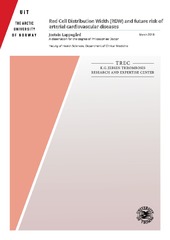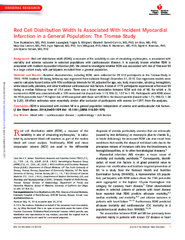| dc.contributor.advisor | Hansen, John-Bjarne | |
| dc.contributor.author | Lappegård, Jostein | |
| dc.date.accessioned | 2018-06-25T08:45:37Z | |
| dc.date.available | 2018-06-25T08:45:37Z | |
| dc.date.issued | 2018-05-28 | |
| dc.description.abstract | Myocardial infarction (MI) and stroke rank as the top two killers on the world health organization’s causes of death statistics. Awareness of risk factors is important for targeted prevention of disease, and identification of novel risk factors can further improve the preventive measures. Red cell distribution width (RDW), a measure of the variability in size of the circulating erythrocytes, could be such a risk factor. A growing number of studies are describing a relationship between RDW and arterial CVD. However, study design and study population limited most of these studies. We therefore aimed to investigate the relationship between RDW and MI, stroke and atherosclerosis in a prospective study of initially disease-free subjects, and explore the underlying mechanism for these associations.
The study population in this thesis was recruited from the fourth (1994-95) and fifth (2001-02) surveys of the Tromsø Study, a large population-based cohort with >27 000 participants. Information on study participants was collected through physical examinations, blood samples and self-administered questionnaires.
In the first paper, we found that RDW was independently associated with incident MI both when modelled as a categorical and a continuous variable. The risk estimates were independent of anemia and common atherosclerotic risk factors. In the second paper, similar analyses were conducted for incident stroke events. RDW was associated with incident stroke, independent of anemia and atherosclerotic risk factors. In the third paper, we found that RDW was independently associated with growth of atherosclerotic plaques between the fourth and the fifth Tromsø survey, both in categorical and continuous analyses. The estimates were unaffected by inclusion of high-sensitivity C-reactive protein (hs-CRP) to the multivariable model. In the fourth paper, we investigated the impact of chronic inflammation, assessed by hs-CRP, on the association between RDW, MI and ischemic stroke. Addition of hs-CRP to the multivariable models attenuated the association slightly. Further, we found that RDW was partly mediating the relationship between hs-CRP and ischemic stroke. | en_US |
| dc.description.abstract | Hjerteinfarkt og hjerneslag er rangert som de to sykdommene som tar flest liv årlig ifølge verdens helseorganisasjons dødsårsak-statistikk. Bevissthet om risikofaktorer er viktig for å kunne utføre målrettet forebygging av sykdommene. Identifisering av nye risikofaktorer kan ytterligere forbedre de forebyggende tiltakene. Red cell distribution width (RDW), et mål på variasjonen i størrelsen til de sirkulerende røde blodcellene, kan være en slik risikofaktor. Et økende antall studier beskriver en assosiasjon mellom RDW og arteriell kardiovaskulær sykdom. Imidlertid er de fleste av disse studiene begrenset av studiedesign og studiepopulasjon. Vårt mål var å undersøke sammenhengen mellom RDW og hjerteinfarkt, hjerneslag og aterosklerose i en prospektiv studie med initialt sykdomsfrie deltakere. Videre ønsket vi å utforske potensielle underliggende mekanismer for sammenhengen mellom RDW og arteriell kardiovaskulær sykdom, og spesielt undersøke effekten av kronisk inflammasjon.
Studiepopulasjonen i denne avhandlingen ble rekruttert fra den fjerde (1994-95) og femte (2001-02) utgaven av Tromsøundersøkelsen og inkluderte >27 000 deltakere. Informasjon om studiedeltakere ble samlet inn ved hjelp av fysiske undersøkelser, blodprøver og spørreskjemaer.
I den første artikkelen så vi at RDW var assosiert med førstegangs hjerteinfarkt både når RDW ble modellert som en kategorisk og en kontinuerlig variabel. Risikoestimatene var uavhengige av anemi og vanlige aterosklerotiske risikofaktorer. I andre artikkel ble det utført lignende analyser for tilfeller av førstegangs hjerneslag. RDW var assosiert med hjerneslag, uavhengig av anemi og aterosklerotiske risikofaktorer. I den tredje artikkelen fant vi at RDW var assosiert med vekst av aterosklerotiske plakk, både i kategoriske og kontinuerlige analyser, mellom den fjerde og den femte tromsøundersøkelsen. Estimatene ble ikke påvirket av høysensitiv C-reaktiv protein (hs-CRP). I den fjerde artikkelen så vi på virkningen av kronisk inflammasjon, målt med hs-CRP, på sammenhengen mellom RDW, hjerteinfarkt og iskemiske hjerneslag. Hs-CRP hadde en svak reduserende effekt på risikoestimatene, men spilte ingen stor rolle. Videre fant vi at RDW delvis medierte forholdet mellom hs-CRP og iskemiske hjerneslag. | en_US |
| dc.description.doctoraltype | ph.d. | en_US |
| dc.description.popularabstract | Heart attack and stroke are the top two deadliest diseases worldwide. Awareness and treatment of known risk factors is an important step to prevent the development of these diseases. Additionally, identification of new risk factors could further improve the disease prevention. We have investigated whether a measure of the variability in the size of the red blood cells (RDW) could be such a risk factor. We used data from the Tromsø study, where RDW was measured in >27,000 inhabitants. We found that the study participants with high values of RDW, measured in 1994/95, had a higher risk of developing atherosclerosis, stroke and heart attack, compared to those with low RDW values. We also found that the disease risk associated with high RDW values was independent of known risk factors including high cholesterol, hypertension, diabetes and smoking. This means that RDW could be used, alongside other risk factors, when evaluating future risk of cardiovascular disease. | en_US |
| dc.description.sponsorship | Forskerlinjen Medisin
Helse Nord | en_US |
| dc.description | The papers II-IV are not available in Munin.<p>
Paper II: Lappegård, J., Ellingsen, T.S., Skjelbakken, T., Mathiesen E.B., Njølstad, I., Wilsgaard, T., … Hansen, J.B. (2016). Red cell distribution width is associated with future risk of incident stroke. Available in <a href=https://doi.org/10.1160/TH15-03-0234>Thrombosis and Haemostasis, 115(1), 126-134.</a> Accepted manuscript version available in <a href=http://hdl.handle.net/10037/9055> Munin.</a><p>
Paper III: Lappegård, J., Ellingsen, T.S., Vik, A., Skjelbakken, T., Brox, J., Mathiesen E.B., … Hansen, J.B. (2015). Red cell distribution width and carotid atherosclerosis progression. Available in <a href=https://doi.org/10.1160/TH14-07-0606>Thrombosis and Haemostasis, 113(3), 649-654.</a> Accepted manuscript version available in <a href= http://hdl.handle.net/10037/9054> Munin.</a><p>
Paper IV: Lappegård, J., Ellingsen, T.S., Hindberg, K., Mathiesen, E.B., Njølstad, I., Wilsgaard, T., … Hansen, J.B. Impact of chronic inflammation, assessed by hs-CRP, on the association between red cell distribution width and arterial cardiovascular disease: The Tromsø Study. (Manuscript). | en_US |
| dc.identifier.uri | https://hdl.handle.net/10037/12988 | |
| dc.language.iso | eng | en_US |
| dc.publisher | UiT The Arctic University of Norway | en_US |
| dc.publisher | UiT Norges arktiske universitet | en_US |
| dc.rights.accessRights | openAccess | en_US |
| dc.rights.holder | Copyright 2018 The Author(s) | |
| dc.rights.uri | https://creativecommons.org/licenses/by-nc-sa/3.0 | en_US |
| dc.rights | Attribution-NonCommercial-ShareAlike 3.0 Unported (CC BY-NC-SA 3.0) | en_US |
| dc.subject | VDP::Medical disciplines: 700::Clinical medical disciplines: 750::Hematology: 775 | en_US |
| dc.subject | VDP::Medisinske Fag: 700::Klinisk medisinske fag: 750::Hematologi: 775 | en_US |
| dc.subject | VDP::Medical disciplines: 700::Health sciences: 800::Epidemiology medical and dental statistics: 803 | en_US |
| dc.subject | VDP::Medisinske Fag: 700::Helsefag: 800::Epidemiologi medisinsk og odontologisk statistikk: 803 | en_US |
| dc.subject | VDP::Medical disciplines: 700::Clinical medical disciplines: 750::Neurology: 752 | en_US |
| dc.subject | VDP::Medisinske Fag: 700::Klinisk medisinske fag: 750::Nevrologi: 752 | en_US |
| dc.subject | VDP::Medical disciplines: 700::Clinical medical disciplines: 750::Cardiology: 771 | en_US |
| dc.subject | VDP::Medisinske Fag: 700::Klinisk medisinske fag: 750::Kardiologi: 771 | en_US |
| dc.subject | The Tromsø Study | |
| dc.subject | Tromsøundersøkelsen | |
| dc.title | Red Cell Distribution Width (RDW) and future risk of arterial cardiovascular diseases | en_US |
| dc.type | Doctoral thesis | en_US |
| dc.type | Doktorgradsavhandling | en_US |


 English
English norsk
norsk




